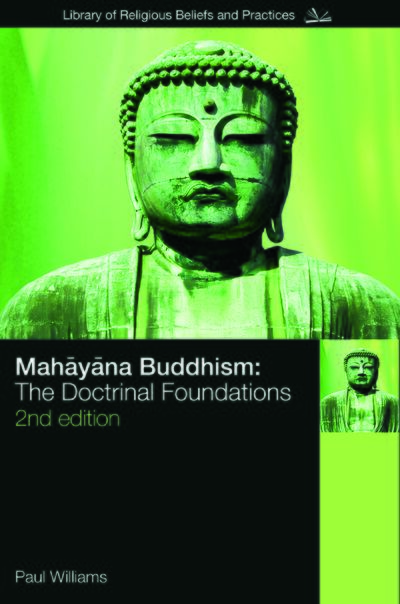Mahāyāna Buddhism: The Doctrinal Foundations
< Books
| Line 12: | Line 12: | ||
**{{i|''On the origins of the Mahāyāna – some more sūtras''|30}} | **{{i|''On the origins of the Mahāyāna – some more sūtras''|30}} | ||
**{{i|''The justification of the Mahāyāna sutras''|38}} | **{{i|''The justification of the Mahāyāna sutras''|38}} | ||
| − | *{{i| | + | *{{i|'''2 The ''Perfection of Wisdom (Prajñāpāramitā) Sūtras'' '''|'''45'''}} |
| − | On the | + | **{{i|''On the Mahāyāna sūtras''|45}} |
| − | The origins and development of the | + | **{{i|''The origins and development of the Prajñāpāramitā literature''|47}} |
| − | Wisdom (prajña) and its perfection 49 | + | **{{i|''Wisdom'' (prajña) ''and its perfection''|49}} |
| − | Absence of Self – the extensive perspective 51 | + | **{{i|''Absence of Self – the extensive perspective|51}} |
| − | The Bodhisattva 55 | + | **{{i|''The Bodhisattva''|55}} |
| − | 3 | + | *{{i|'''3 Mādhyamika'''|'''63'''}} |
| − | + | **{{i|''Nāgārjuna and Āryadeva''|63}} | |
| − | The development of the | + | **{{i|''The development of the Mādhyamika tradition in India''|65}} |
| − | Emptiness and intrinsic existence – the incompatible rivals 68 | + | **{{i|''Emptiness and intrinsic existence – the incompatible rivals''|68}} |
| − | A brief note on | + | **{{i|''A brief note on Mādhyamika method''|71}} |
| − | Three | + | **{{i|''Three Mādhyamika critiques''|72}} |
| − | On causation 73 | + | **{{i|''On causation''|73}} |
| − | On the Self 74 | + | **{{i|''On the Self''|74}} |
| − | On | + | **{{i|''On nirvāṇa''|75}} |
| − | The two truths 76 | + | **{{i|''The two truths''|76}} |
| − | + | **{{i|''Meditation and emptiness – an impressionistic outline''|79}} | |
| − | Meditation and emptiness – an impressionistic outline 79 | + | **{{i|''A final note – Mādhyamika in China and East Asia''|81}} |
| − | A final note – | + | *{{i|'''4 Yogācāra'''|'''84'''}} |
| − | 4 | + | **{{i|''Background''|84}} |
| − | Background 84 | + | **{{i|''The Yogācāra tradition – scholars and texts''|86}} |
| − | The | + | **{{i|''The three natures'' (trisvabhava)|88}} |
| − | The three natures (trisvabhava) 88 | + | **{{i|''Mind''|92}} |
| − | Mind 92 | + | **{{i|''Substratum consciousness, consciousness and immaculate consciousness''|97}} |
| − | Substratum consciousness, consciousness and immaculate consciousness 97 | + | **{{i|''Yet more disputes within the Yogācāra tradition''|100}} |
| − | Yet more disputes within the | + | *{{i|'''5 The Tathāgatagarbha'''|'''103'''}} |
| − | 5 The | ||
Some TathAgatagarbha SEtras 104 | Some TathAgatagarbha SEtras 104 | ||
The Tathagatagarbha in the Ratnagotravibhaga 109 | The Tathagatagarbha in the Ratnagotravibhaga 109 | ||
Revision as of 13:57, 26 June 2020
Originating in India, Mahayana Buddhism spread across Asia, becoming the prevalent form of Buddhism in Tibet and East Asia. Over the last twenty-five years Western interest in Mahayana has increased considerably, reflected both in the quantity of scholarly material produced and in the attraction of Westerners towards Tibetan Buddhism and Zen.
Paul Williams’ Mahayana Buddhism is widely regarded as the standard introduction to the field, used internationally for teaching and research and has been translated into several European and Asian languages. This new edition has been fully revised throughout in the light of the wealth of new studies and focuses on the religion’s diversity and richness. It includes much more material on China and Japan, with appropriate reference to Nepal, and for students who wish to carry their study further there is a much-expanded bibliography and extensive footnotes and cross-referencing. Everyone studying this important tradition will find Williams’ book the ideal companion to their studies. (Source: Routledge)
| Citation | Williams, Paul. Mahayana Buddhism: The Doctrinal Foundations. 2nd ed. The Library of Religious Beliefs and Practices. New York: Routledge, 2009. https://archive.org/details/mahayanabuddhismthedoctrinalfoundationspaulwilliamsroutledgeseealtruismandreality_202003_445_W/mode/2up. |
|---|---|

